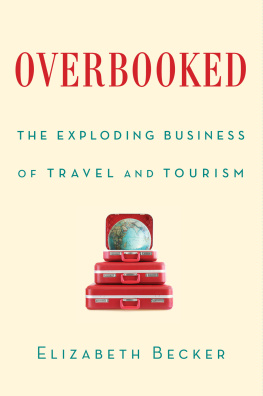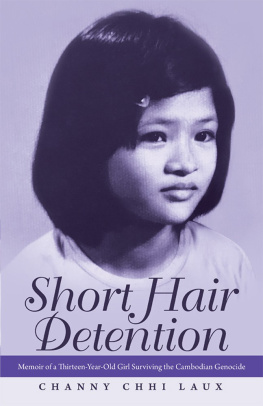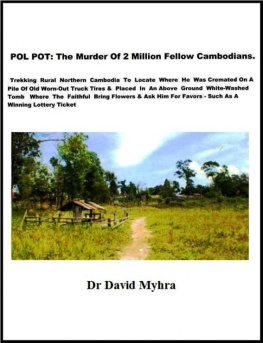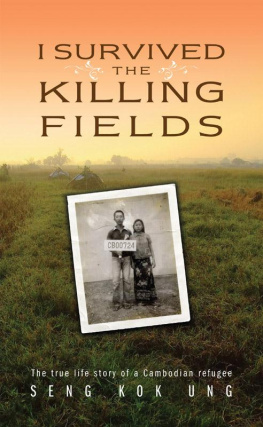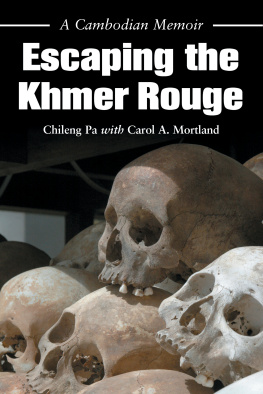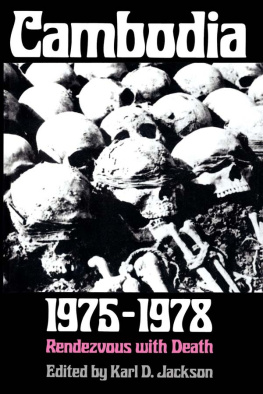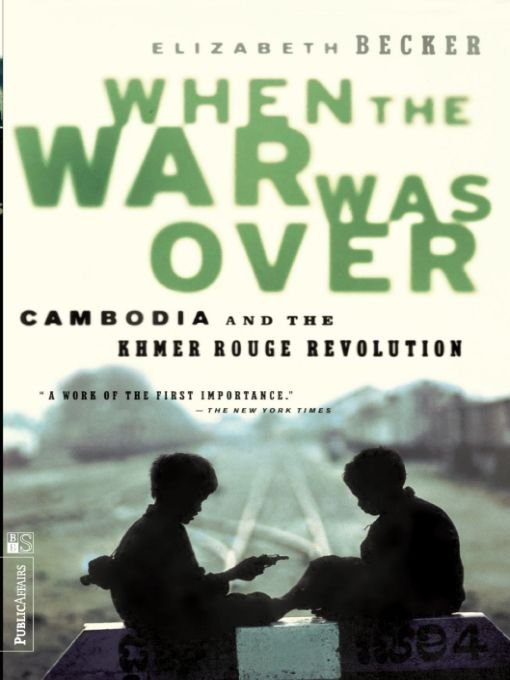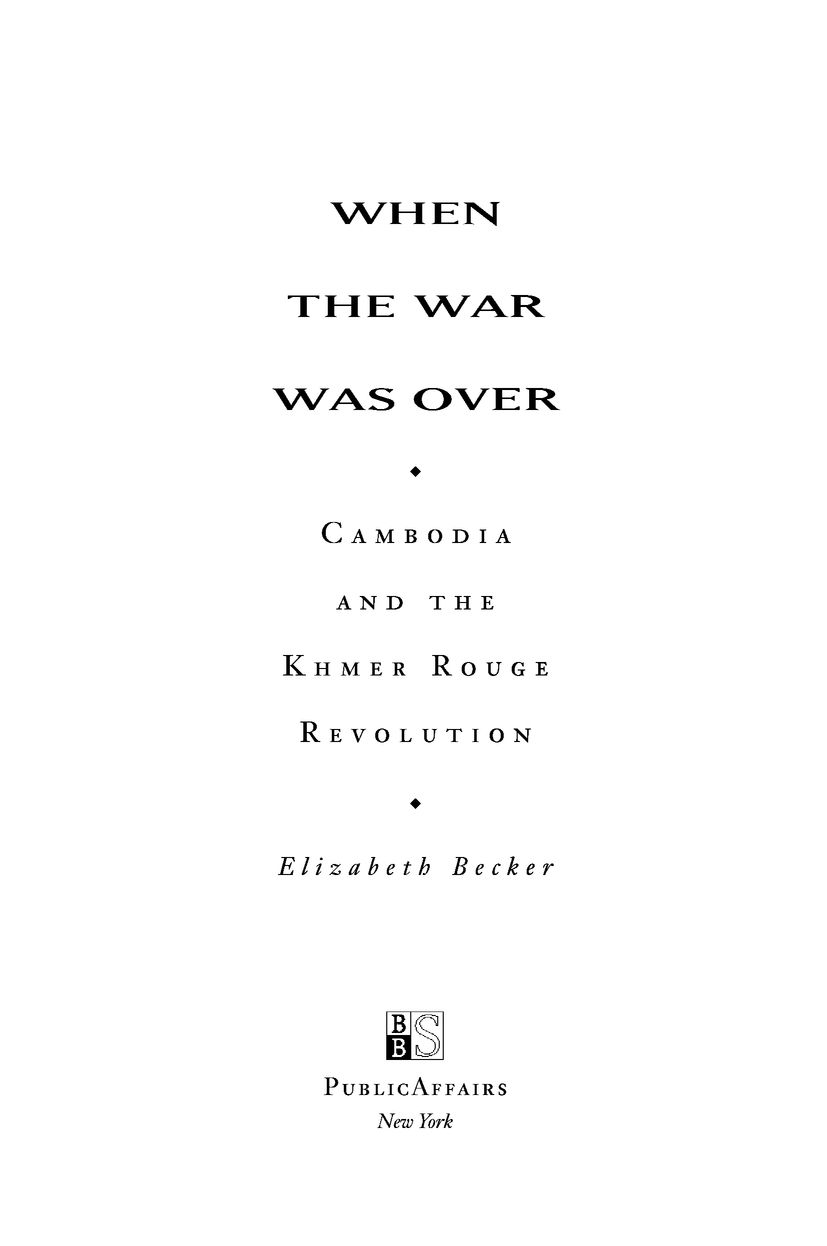Table of Contents
For their constant inspiration,
this book is dedicated with love
to my daughter Lily and
my son Lee Clayton.
Do you find it strange that as we become more sensitive to the sufferings of mankind, we become more and more cruel? The more we think of the human body and the human mind as being able to suffer, and the sorrier we feel for that, and the more we plan to prevent suffering, the more we are drawn to inflict suffering. The more tortures we think up. The more people we believe deserve to be tortured. The more we think that people can be ruled by fear of suffering. We have become our brothers keeperand we will keep him in fear, we will keep him in concentration camps, we will keep him in straitjackets, we will keep him in the grave.
The Middle of the Journey by Lionel Trilling
PREFACE
Pol Pot died in 1998, having eluded all attempts to bring him to justice for one of this centurys worst mass murders. In the twenty years after I interviewed him, days before he fell from power, he remained unrepentant for his Khmer Rouge revolution that devastated Cambodia, killing nearly one-fourth of the population, including an entire generation of political leaders, professionals, and religious figures.
Cambodia has been crippled by that legacy. It took a dozen years and a $2 billion United Nations peace plan to end the war over who would lead the country after the Vietnamese withdrawal. The Khmer Rouge actually planned to field candidates in the 1992 election up until the final months when they realized they had no hope of winning. As of this writing, the prime minister is Hun Sen, himself a former Khmer Rouge, who bullied his way to power after losing the election to Prince Norodom Ranariddh and who has since trampled most of the freedoms promised under the peace plan and sacrificed the countrys recovery.
The current crisis in Cambodia cannot be understood without a thorough understanding of the Khmer Rouge revolution, which is one reason why I have updated and revised When the War Was Over. Another reason is to help answer the extraordinary number of questions that have arisen since the books original publication. Cambodias tragedy is now universally recognized as one of this centurys worst crimes against humanity. The Khmer Rouge are ranked with the Nazis for their atrocities, yet when international tribunals were established in the last five years to try war criminalsthe first since the Nuremberg trialstheir mandate covered only those from the former Yugoslavia and Rwanda, not from Cambodia. Part of the reason is the confusion over the history of Cambodia and Indochina, and the passions it still stirs here in the United States. Having fought its longest war in Vietnam, losing over 50,000 Americans in those distant battlefields, the U.S. government has played an often questionable role in the Cambodian saga ever since. Finally, Pol Pots death offered a natural ending to this book, a history of modern Cambodia and the Khmer Rouge.
When I started covering Cambodia in 1973 it was still a footnote to the Vietnam War. The Cambodian people were still blessedly ignorant of the true nature of the Khmer Rouge who would take power two years later. In the twenty-five intervening years I earned the dubious distinction of being the only journalist to have reported from that country under every one of its governments: Lon Nols Khmer Republic, Pol Pots Democratic Kampuchea, Heng Samrin and Hun Sens Peoples Republic of Kampuchea, and Norodom Ranariddh and Hun Sens Kingdom of Cambodia. Like other journalists and historians who follow a country through extraordinary times, I have to admit that I rarely understood the enormity of the events I was witnessing until after the fact, until I assembled the material necessary to write this book, and now to revise it and add the new chapters to bring it up to date. This updated version is based in large part on my interviews with Cambodians and foreign diplomats throughout the long and convoluted peace negotiations that began after the Vietnamese chased the Khmer Rouge from power in 1979. I lived in Paris from 1986 through 1990 when that city became the focus for the final Paris Peace Accords. After returning to Washington I continued travelling to Cambodia to complete the research.
Since many of the original themes of the book remain the same, I offer the following preface to the first edition with relatively few changes.
It was late one afternoon during the monsoon season and I was waiting for a break in the cloudbursts. The rains had been heavy all week, drenching the Cambodian countryside and forcing soldiers and their commanders to call off battle plans. During these stretches of nervous, idle time when there was little to report or write, I did what was most comforting. I visited friends and talked about the war.
When the rains stopped I walked out of my solid old hotel and hailed the lone trishaw pedaling by the front gate. The driver and I were both shrouded in plastic and shod in rubber thongs and we easily set a price for the short distance to the home of my friend. The driver was talkative and asked me in French, far better than mine, who I was. When I replied I was an American journalist he switched to broken English and started what I considered the classic conversation of wartime Phnom Penh. He told me about his past, how he had taught at a provincial lyce until the war crowded in and he was forced to take refuge in the capital. He had no sympathy for either side and was fully engaged in keeping his family together, housed, and fed until the war was over and they could return to the provinces. He hoped his house and the lyce would still be standing.
He was charming in the easy Cambodian fashion that neither threatens nor encourages a future friendship. While he navigated through puddles we laughed over a silly pun or spoke seriously of impending rocket attacks. I overtipped him, one of the few acts of material generosity my budget allowed, and we said goodbye.
It was the rainy season of 1973, when the countrys seams were visibly tearing and more than one Cambodian friend had questioned privately what would be left standing once the war was over. The pedicab driver was less sanguine than he appeared. He left me a note at the home of my friend, an Asian diplomat, addressed to Lady Wednesday Night. He wrote in the script taught at French schools: Could Lady Wednesday Night show him greater kindness and help his family find better quarters until the war was over and they were able to care for themselves. He would be waiting for me outside the hotel gates.
By then, however, the regular trishaw drivers had taken up their positions at the hotel stand and my petitioner had no chance of finding a spot there. Nor did he return to the home of my diplomat friend and I never saw him again.
But I did hear his sentiments voiced over and over again. At odd momentsover a coffee at an open-air cafe, in the sapphire mines of the western mountains, with villagers trading at a provincial market, or with soldiers guarding a makeshift defense position inside pagoda groundsCambodian friends and strangers relaxed by talking about their very private plans for a new life when the war was over. It was a national anthem and undoubtedly other people in other wars dispelled their fears with similar conversations about a future without bombs or bullets or refugee camps.


